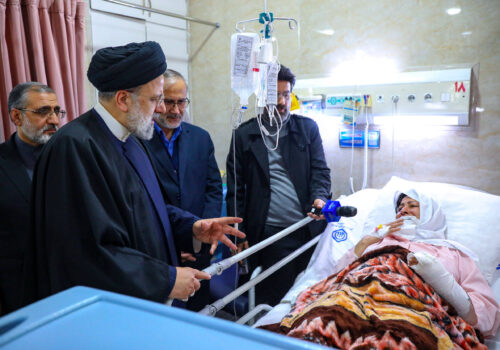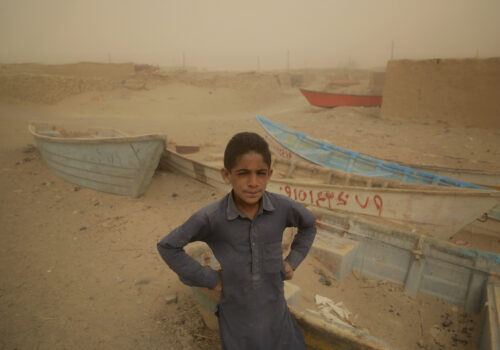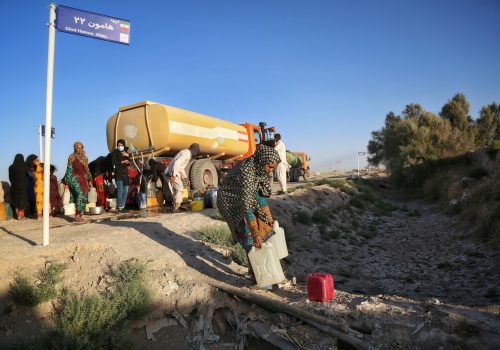A miscalculated aggression: How Pakistan’s response exposed Iran’s vulnerabilities
On January 16, Iran’s armed forces launched several missile and drone attacks against Iraq, Syria, and Pakistan, leaving several civilians dead, including children, in both Iraq and Pakistan. The Islamic Revolutionary Guards Corps (IRGC) boasted that the strikes were in defense of Iran’s national security and in response to several attacks that had killed Iranian citizens and military commanders inside and outside the country. The IRGC was particularly referring to the Kerman bombing on January 3—claimed by the Islamic State of Iraq and al-Sham (ISIS)—and the assassination of Razi Mousavi—a significant IRGC figure in Syria—on December 25, 2023. The IRGC issued several statements claiming that Iran’s offensive targeted sites for hostile elements, including “espionage centers and gatherings of anti-Iranian terrorist groups” in Iraq and Syria, and allegedly the foreign terrorist organization, Jaish Al-Adl (Army of Justice), in Pakistan’s Balochistan province.
The IRGC offensive evoked euphoria among Iran’s supporters at home and abroad and Iranian officials who bragged about their country’s military capabilities. Although Iran has previously targeted Iraq and Syria, this is the first time they have openly engaged in hostile military action against nuclear-armed Pakistan. The attack placed Pakistan’s armed forces in a critical situation. Lately, Pakistan’s military has been involved in an internal power struggle to keep a tight grip over the political elite, which has undermined the regional position and influence of the country. A lack of a response to the Iranian attacks would have signaled a weak Pakistan and, thus, encouraged rivals to challenge it. Indeed, following the Iranian assaults, India—which shares extensive ties with Iran and Russia—issued a statement supportive of Tehran, increasing pressure on Islamabad to respond.
However, the euphoria did not last long. In the early morning of January 18, Pakistan’s air force conducted well-measured attacks in Sistan and Baluchistan province against alleged sites of the Balochistan Liberation Army, an insurgent group, killing several civilians, including children. The attacks left Tehran dazed and shocked, as this was the first time since the eight-year Iran-Iraq War (1980-1988) that a country had bombed targets inside Iran. Pakistan’s decisive retaliation reminded Tehran of its place and put the ball in the latter’s court. An Iranian decision to escalate with Pakistan would humiliate the Islamic Republic’s outdated conventional armed forces, which date back to pre-1979 and are no match for their Pakistani counterparts. Pakistan has historically received advanced military equipment and technology from various sources, including the United States and China, and has developed its forces with a strong focus on conventional warfare to counter India. Realizing this, Iranian officials had to reluctantly accept a de-escalation.
Iran’s recent military attacks, as seen through its missile and drone strikes in neighboring countries, reveal a complex blend of strategic intentions and miscalculations. These assaults, while initially intended to assert Iran’s regional power and retaliate against perceived threats, have simultaneously exposed its vulnerabilities and provoked significant backlash from both regional players and the international community.
First, Iran’s actions have heightened regional tensions, potentially destabilizing an already volatile Middle East. Iran probably assumed that having leverage over Iraq and Syria, as well as increasingly good ties with Pakistan, could allow it to get away with the attacks. However, striking within the sovereign territories of neighboring countries has been perceived as an act of aggression, undermining Iran’s relations with these states. Tehran’s decision was a gamble that risked an escalation into broader conflicts, drawing in more regional and international players.
SIGN UP FOR THE THIS WEEK IN THE MIDEAST NEWSLETTER
Second, while Iran aimed to showcase its military capabilities and resolve, the strikes inadvertently highlighted its vulnerabilities. Pakistan’s response called into question the effectiveness of Iran’s deterrence strategy and demonstrated that Iran’s defensive systems are not as robust as Tehran claims, since Pakistan was able to infiltrate Iranian air space with ease. Iran’s assumption of regional military dominance was challenged, showing that its aggressive postures could be met with equally forceful responses, even from neighbors not posing themselves as rivals or enemies to Iran. This realization could embolden other regional adversaries—such as Israel—to undermine the narrative of a strong and impenetrable Iran.
Third, Iran’s focus on external military engagements has raised questions about its internal stability and governance. The Islamic Republic faces domestic pressure and criticism, and its external military actions may be partly an attempt to divert attention from these issues. Moreover, during the last few years, Iran has been subjected to numerous assassinations—mostly by Israel—that have targeted its scientists and military commanders, thus, unveiling a weak security apparatus. However, shifting focus to “foreign enemies” to unify the internal front and distract from internal challenges has ended up introducing a new internal discussion on Iran’s ability to protect its citizens, ironically exacerbating internal discontent.
Fourth, the Islamic Republic pays a lot of attention to its image in the Muslim world in order to legitimize its influence, facilitate its expansive agenda, and recruit both proxy members and supporters. This effort was damaged due to its role in Syria and Iraq following the eruption of the 2011 Arab uprisings. Israel’s intervention in Gaza in October 2023 provided Iran with an opportunity to fix its public perception and rebrand itself as a “resistance” actor. However, the Pakistani retaliation exposed the Iranian bluff on that front; Iraq’s Foreign Minister, Fuad Hussein, asserted that Iran’s inability or unwillingness to confront Israel led it to direct its aggression towards its neighboring countries. As a result, the gains the Islamic Republic achieved following the start of the Gaza war have been reversed.
For example, the Iranian aggression triggered anti-Iran sentiments in Iraqi society, driving civil society to call for the boycott of Iranian products. Additionally, the Syrian opposition condemned Tehran, reminding the international community of Iran’s crimes in Syria, as well as the fertile ground that the Iran-supported Bashar al-Assad regime creates for terrorist organizations to emerge and thrive. Overall, Iran’s actions were widely viewed in the Arab and Muslim worlds as an unwelcome distraction and a diversion from the Gaza war.
The global community’s reaction, including restraint calls from China and condemnation from the United States, further isolated Iran. These reactions indicate growing concern about Tehran’s regional policies and their potential to further destabilize the Middle East. Accordingly, Iran’s actions also reflect a broader strategic dilemma. On the one hand, Iran seeks to assert its regional dominance. On the other, it must navigate the complex dynamics of its relationships with neighboring countries, which are crucial for its security and economic interests. Striking a balance between these objectives has proven challenging.
Moreover, while the Islamic Republic strives to promote an image of itself as a rational and responsible actor, especially while addressing concerns from Western countries, its actions portray a very different picture of a reckless and irresponsible regional player. In conclusion, Iran’s recent military strikes, while intended to underscore its growing far-reaching capabilities and resolve, also reveal significant strategic miscalculations. These actions have heightened regional tensions, exposed vulnerabilities, and complicated its relationships with neighboring countries. It’s worth noting that this is not the first time Iran has miscalculated; in 2006, its miscalculation led to a destructive Israeli war on Lebanon.
Similarly, in 2019, Tehran miscalculated when it assumed that its escalation campaign in the Gulf against US and allied targets would not be met by retaliation. This ultimately led to the killing of IRGC Quds Force Commander Qasem Soleimani via a US drone strike. Now, Iran has overplayed its hand with Pakistan and was reminded of its proper place. In all these cases, Iran was forced to swallow its pride, offering no retaliation. Whether Tehran can learn from this and avoid another critical miscalculation in the future remains to be seen.
Ali Bakir is a nonresident senior fellow with the Scowcroft Middle East Security Initiative at the Atlantic Council’s Middle East programs.
Further reading
Mon, Jan 8, 2024
ISIS was behind the Kerman attack. Iran still blames Israel and the United States, though.
IranSource By Jason Brodsky
Despite Iran’s bombastic rhetoric, however, its response against ISIS assets will likely be limited.
Mon, Jan 22, 2024
A thirsty reality: Iran’s dire water situation
IranSource By Nik Kowsar
Iran’s uneven water rights approach disproportionately impacts citizens in marginalized provinces, causing severe water scarcity.
Fri, Jul 7, 2023
Iran and Afghanistan are feuding over the Helmand River. The water wars have no end in sight.
IranSource By Holly Dagres
Fatemeh Aman, a non-resident senior fellow at MEI, on why the Islamic Republic and Taliban are bumping heads on transboundary water issues.
Image: A man watches a news channel on television inside a shop after the Pakistani foreign ministry said the country conducted strikes inside Iran targeting separatist militants, two days after Tehran said it attacked Israel-linked militant bases inside Pakistani territory, in Peshawar, Pakistan January 18, 2024. REUTERS/Fayaz Aziz


